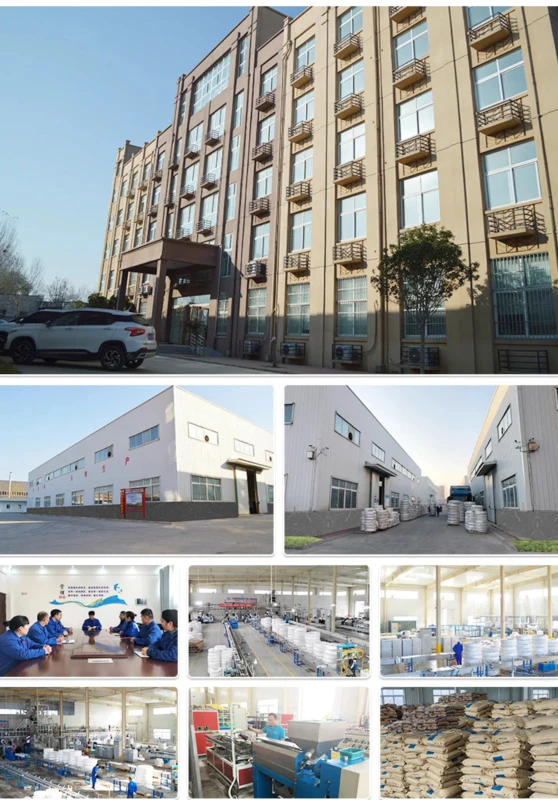Flexible Chain

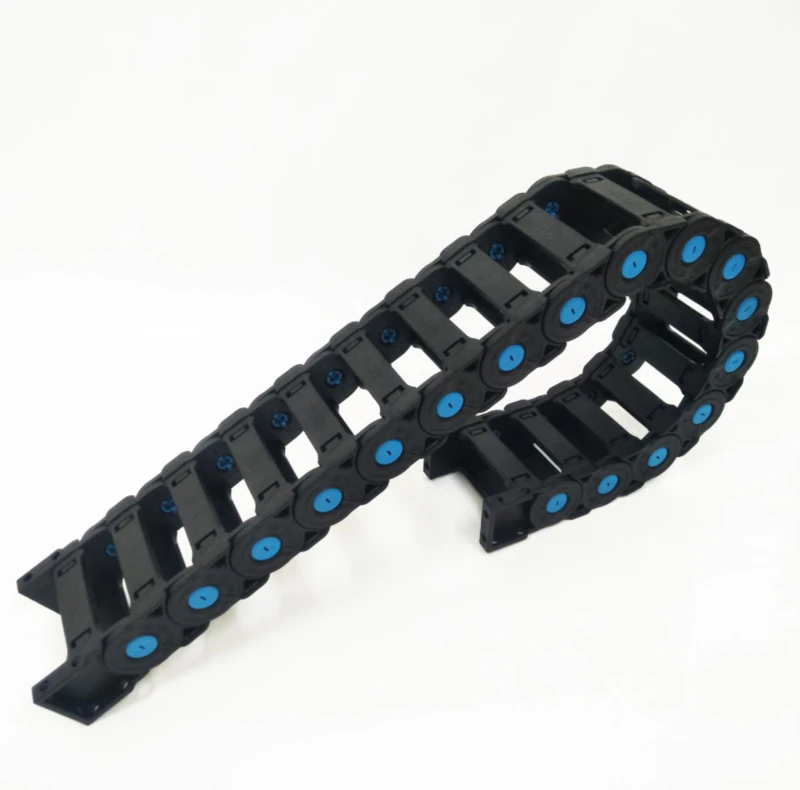
Professional manufacturing and production
Our flexible chains are designed to provide smooth and reliable operation, ensuring the efficient and safe transportation of materials across various industries. Whether in manufacturing, logistics, or warehousing, our flexible chains are a trusted solution for companies seeking to optimize their production processes.
We are backed by a team of experienced professionals and are committed to providing exceptional customer service and support. We work closely with our clients to understand their needs and provide customized solutions that meet their requirements.
Choose us as your trusted partner for flexible chain solutions, and we’ll help you achieve greater efficiency and productivity in your operations.
Flexible chain for sale
-

flexible cable chain cable track carrier system drag chain
-

flexible plastic drag carrier Power track flexible cable chain
-
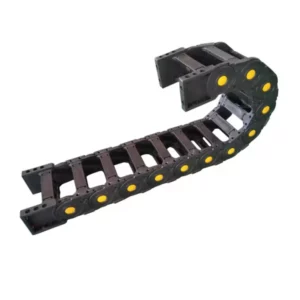
Heavy duty load bearing plastic cable chain flexible cable tray cable carrier nylon drag chain
-

High-speed CNC cable chain flexible plastic cable carrier energy chain made in China bridge type cable wire tracks
-

New Drag Chains Flexible Cable Track Chain Steel Cable Drag Chain
-

similar IGUS 15mm x 50mm Plastic drag chain flexible cable tray chain cable energy chain
Advantages of flexible chain compared with traditional chain
Reduced Noise Levels: Flexible chains are generally quieter than traditional chains, making them suitable for environments where noise reduction is essential. This is because the design of flexible chains often includes smoother joints and less metal-on-metal contact.
Lower Maintenance: Flexible chains typically require less maintenance. They are often made with self-lubricating materials or designed to minimize the buildup of debris and dirt, reducing the need for frequent cleaning and lubrication.
Ease of Installation: Flexible chains are usually easier and quicker to install and replace due to their modular design. This modular nature also allows for easier repairs and modifications, as individual sections can be replaced without dismantling the entire system.
Durability: Flexible chains are designed to withstand various environmental factors, such as temperature variations, chemical exposure, and moisture, which might degrade traditional chains faster. This makes them more durable and suitable for harsh industrial environments.
Versatility in Applications: Flexible chains’ adaptability means they can be used across various industries—from food processing to pharmaceuticals and manufacturing—without significant alterations to the underlying conveyor framework.
Improved Load Handling: Flexible chains often provide better weight distribution across the conveyor system. This feature is advantageous in applications requiring the transport of delicate or unevenly distributed loads.
Reduced Wear and Tear: The engineering of flexible chains often focuses on reducing the contact stress between the moving parts, leading to decreased wear and tear compared to traditional chains, which may experience quicker degradation due to rigid links and potential misalignment.
Higher Operational Efficiency: Flexible chains can move smoothly around curves and obstacles, which reduces the time and energy spent on transfers and directional changes. This efficiency can lead to reduced operational costs and higher productivity.
Cost-Effectiveness Over Time: Although the initial cost of flexible chains might be higher, their extended lifespan and reduced maintenance needs can make them more cost-effective over the long term.
Characteristics of Flexible chains
Lightweight and Durable: Flexible chains are often made from lightweight materials that provide both strength and durability. This combination of properties allows them to handle heavy loads while remaining easy to handle and install.
Smooth Operation: The flexible design of these chains contributes to smooth and seamless operation, reducing friction and wear. This results in longer chain life and improved overall performance.
Versatility in Applications: Flexible chains find widespread use in various industries and applications, including conveyor systems, material handling, and automation equipment. Their ability to conform to different shapes and sizes makes them highly versatile.
Ease of Maintenance: Flexible chains typically require less maintenance than rigid chains due to their smooth operation and resistance to wear. This reduces downtime and maintenance costs, enhancing overall efficiency.
Environmental Compatibility: Many flexible chain materials are designed to be environmentally friendly, non-toxic, and safe for use in various industrial settings. This makes them suitable for companies that prioritize sustainability and safety.
Application areas of flexible chain
Food and beverage industry: In food and beverage production lines, flexible chains are used to transport food packaging, bottled beverages, cans and other products from the production line to the packaging line, and can also transport packaged food products to storage areas or transportation areas. .
Pharmaceutical and chemical industry: Flexible chain conveyors are also used in the pharmaceutical and chemical industry. They are mainly used to transport drugs, chemicals and various raw materials, as well as transport finished products to packaging or sub-packaging areas.
Electronics industry: In the manufacturing process of electronic products, flexible chains are used to transport electronic components, electronic equipment, and assembled electronic products, such as mobile phones, computers, etc.
E-commerce industry: With the rapid development of e-commerce, flexible chains are increasingly used in the e-commerce industry. It can be used for order processing, cargo sorting and packaging, improving warehousing and logistics efficiency, and meeting the need for fast delivery.
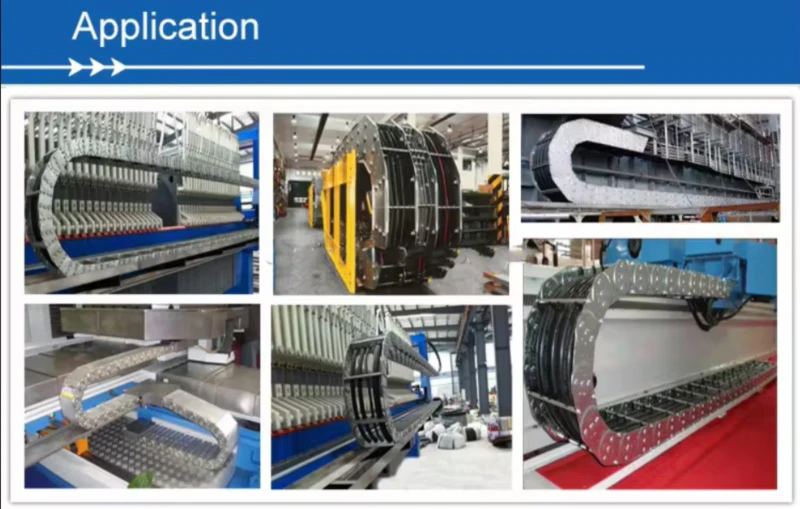
The structure of flexible chain
Flexible chain consists of multiple chain links, each chain link usually consists of two or more chain plates, and the chain plates are connected by pins or hinges. This design allows the links to bend freely, making the entire chain highly flexible.
2. Material selection:
The materials of the chain links and pins are usually selected from high-strength, wear-resistant metals, such as stainless steel or alloy steel, to ensure the durability and load-bearing capacity of the chain. In addition, some special applications may require the selection of materials with special properties such as anti-corrosion and high temperature resistance.
3. Chain width and thickness:
The width and thickness of the flexible chain can be adjusted according to actual application requirements. A wider chain can provide a larger support area and stronger load-bearing capacity, while a thicker chain can increase the rigidity and stability of the chain.
4. Surface treatment:
In order to increase the wear resistance and service life of flexible chains, the surface of the link is usually treated with special treatments, such as spraying, electroplating or hot-dip galvanizing. These treatments can not only improve the corrosion resistance of the chain, but also reduce the friction coefficient and reduce energy loss.
5. Accessories and connectors:
Flexible chain can also be equipped with various accessories and connecting parts, such as guide wheels, support frames, chain tensioners, etc. These accessories and connections help to better secure and support the chain, improving its stability and reliability during operation.
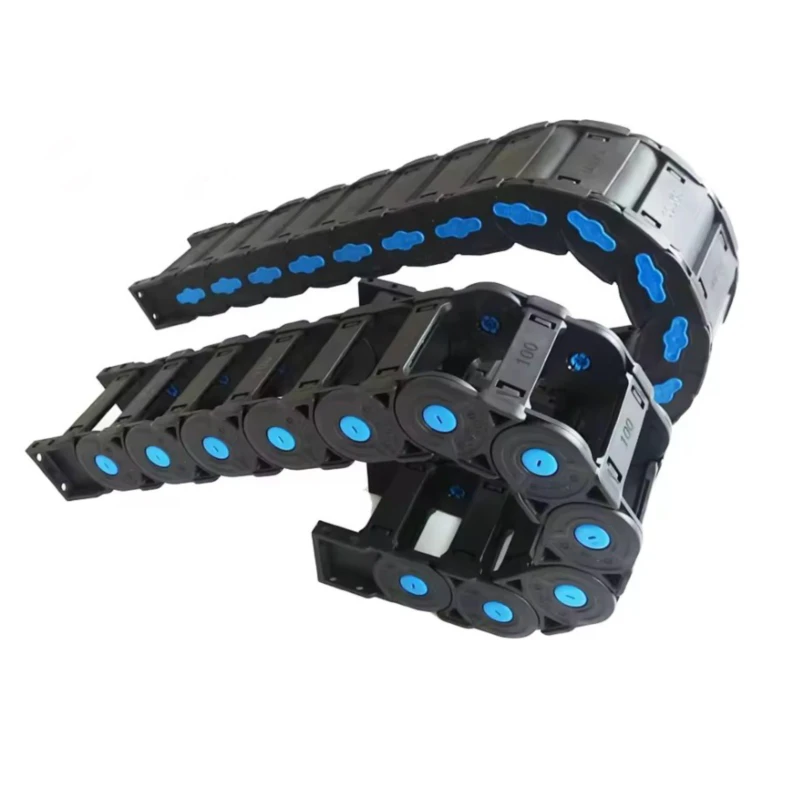

Key process steps in the manufacturing process of lexible chain
Chain link forming: The forming of chain links is an important step in the manufacturing process. This usually involves processes such as stamping, forging or casting, where pre-processed materials are processed into links of specific shapes and sizes. During this process, the molding temperature and pressure need to be strictly controlled to ensure the accuracy and strength of the chain links.
Pin assembly: The connection between chain links relies on pins. The assembly of the pin needs to ensure that it matches the link hole to ensure the flexibility and stability of the chain. In addition, the connection method between the pin and the chain link (such as welding, riveting, etc.) also needs to be selected and optimized according to the specific situation.
Heat treatment and surface treatment: In order to improve the strength and wear resistance of the chain, heat treatment, such as quenching, tempering, etc., is usually required. At the same time, in order to enhance the corrosion resistance and aesthetics of the chain, surface treatment is also required, such as spraying, electroplating, etc.
Quality inspection and testing: In the final stage of the manufacturing process, the flexible chain needs to undergo strict quality inspection and testing, including dimensional measurement, tensile testing, fatigue testing, etc., to ensure that the product meets the design requirements and usage standards.
What materials are the components of the flexible chain made of?
Food and beverage industry: In food and beverage production lines, flexible chains are used to transport food packaging, bottled beverages, cans and other products from the production line to the packaging line, and can also transport packaged food products to storage areas or transportation areas. .
Pharmaceutical and chemical industry: Flexible chain conveyors are also used in the pharmaceutical and chemical industry. They are mainly used to transport drugs, chemicals and various raw materials, as well as transport finished products to packaging or sub-packaging areas.
Electronics industry: In the manufacturing process of electronic products, flexible chains are used to transport electronic components, electronic equipment, and assembled electronic products, such as mobile phones, computers, etc.
E-commerce industry: With the rapid development of e-commerce, flexible chains are increasingly used in the e-commerce industry. It can be used for order processing, cargo sorting and packaging, improving warehousing and logistics efficiency, and meeting the need for fast delivery.
Why choose our company?
2. Comprehensive Service: We pride ourselves on providing excellent customer service. Our professional team is ready to answer your questions, provide technical support, and provide solutions tailored to your needs.
3. Competitive Prices: Our company offers competitive prices without compromising quality. We believe in creating value for our customers and work hard to ensure our products fit every budget.
4. Excellent after-sales support: We know a product is only as good as the support you receive after purchasing it. Our company provides comprehensive after-sales services, including timely repair, replacement, and maintenance, ensuring that your flexible chain are in optimal condition for a more extended period.
5. Rich product range: Our company provides a variety of flexible chain shafts to meet different applications and requirements. We can provide you with the right product.
